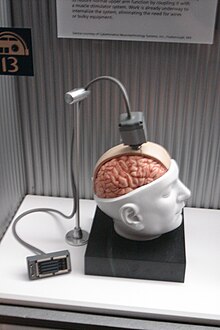J
John Wang
Guest
:format(webp)/cdn0.vox-cdn.com/uploads/chorus_image/image/53921643/490597796.0.jpg)
SpaceX and Tesla CEO Elon Musk is backing a brain-computer interface venture called Neuralink, according to The Wall Street Journal. The company, which is still in the earliest stages of existence and has no public presence whatsoever, is centered on creating devices that can be implanted in the human brain, with the eventual purpose of helping human beings merge with software and keep pace with advancements in artificial intelligence. These enhancements could improve memory or allow for more direct interfacing with computing devices.
Musk has hinted at the existence of Neuralink a few times over the last six months or so. More recently, Musk told a crowd in Dubai, “Over time I think we will probably see a closer merger of biological intelligence and digital intelligence.” He added that “it's mostly about the bandwidth, the speed of the connection between your brain and the digital version of yourself, particularly output." On Twitter, Musk has responded to inquiring fans about his progress on a so-called “neural lace,” which is sci-fi shorthand for a brain-computer interface humans could use to improve themselves.
These types of brain-computer interfaces exist today only in science fiction. In the medical realm, electrode arrays and other implants have been used to help ameliorate the effects of Parkinson’s, epilepsy, and other neurodegenerative diseases. However, very few people on the planet have complex implants placed inside their skulls, while the number of patients with very basic stimulating devices number only in the tens of thousands. This is partly because it is incredibly dangerous and invasive to operate on the human brain, and only those who have exhausted every other medical option choose to undergo such surgery as a last resort.
This has not stopped a surge in Silicon Valley interest from tech industry futurists who are interested in accelerating the advancement of these types of far-off ideas. Kernel, a startup created by Braintree co-founder Bryan Johnson, is also trying to enhance human cognition. With more than $100 million of Johnson’s own money — the entrepreneur sold Braintree to PayPal for around $800 million in 2013 — Kernel and its growing team of neuroscientists and software engineers are working toward reversing the effects of neurodegenerative diseasesand, eventually, making our brains faster and smarter and more wired.

“We know if we put a chip in the brain and release electrical signals, that we can ameliorate symptoms of Parkinson's,” Johnson told The Verge in an interview late last year. (Johnson also confirmed Musk’s involvement with Neuralink.) “This has been done for spinal cord pain, obesity, anorexia… what hasn’t been done is the reading and writing of neural code.” Johnson says Kernel’s goal is to “work with the brain the same way we work with other complex biological systems like biology and genetics.”
Kernel, to its credit, is quite upfront about the years of medical research necessary to better understand the human brain and pioneer new surgery techniques, software methods, and implant devices that could make a consumer brain-computer interface a reality. The Wall Street Journal says Neuralink was founded as a medical research company in California last July, which bolsters the idea that Musk will follow a similar route as Johnson and Kernel.
To be fair, the hurdles involved in developing these devices are immense. Neuroscience researchers say we have very limited understanding about how the neurons in the human brain communicate, and our methods for collecting data on those neurons is rudimentary. Then there’s the idea of people volunteering to have electronics placed inside their heads.
“People are only going to be amenable to the idea [of an implant] if they have a very serious medical condition they might get help with,” Blake Richards, a neuroscientist and assistant professor at the University of Toronto, told The Verge in an interview earlier this year. “Most healthy individuals are uncomfortable with the idea of having a doctor crack open their skull.”







